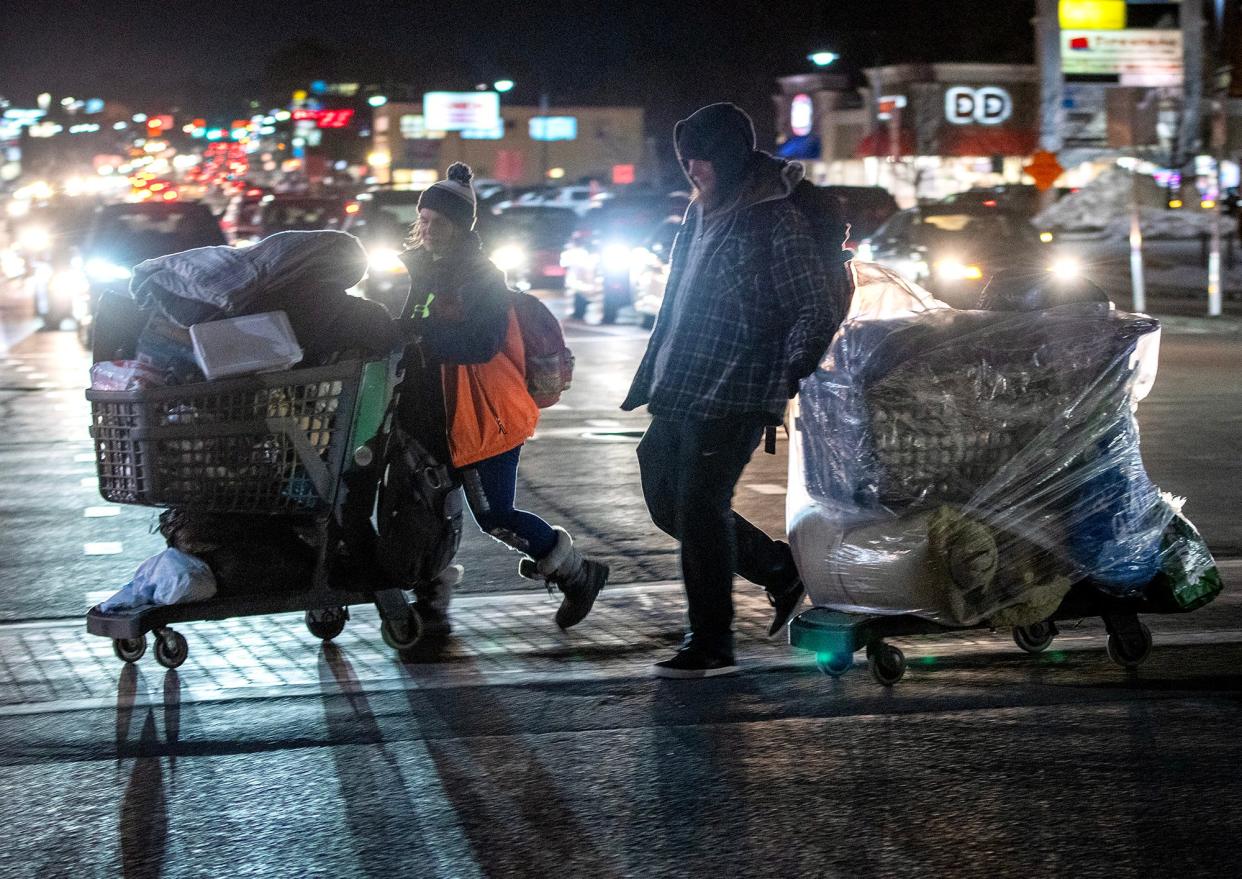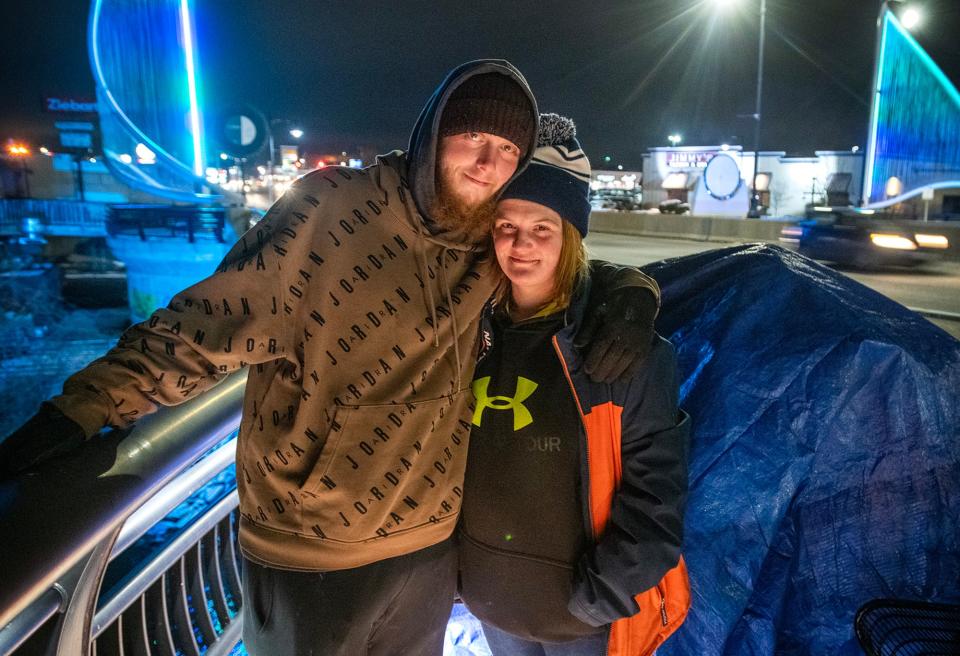Advocate for Worcester's homeless speaks from experiences, works with City Council

WORCESTER — Samantha Olney didn’t set out to be the voice of a community. She just wanted a place to sleep.
While the average person rarely gives that question a passing thought, for Olney, 32, finding an answer can take up the better part of her day, especially in the winter.
What started as advocating for herself and her partner soon evolved into speaking up on behalf of Worcester’s homeless population and culminated with speaking at a City Council meeting. Feb. 6, Olney, who has been homeless since she was forced to leave home at 17, brought the petition requesting that the city allow people who are homeless to set up tents in public spaces such as parks.
While the City Council unanimously voted against it, Olney said it went better than expected. Opposition to the petition was unsurprising, she said, adding, “There was a lot of compassion from the City Council.”
The main result of the meeting was that Olney will now attend the Supportive Housing and Services meeting, organized by the city manager’s office and held on the first Thursday of every month.
While not a solution in itself, Olney now feels that there is finally progress toward addressing the issue of not enough shelter to meet demand, now that people who are homeless may actually have a voice in the process.

'Somebody needs to do it'
This makes Olney the de facto representative of the city’s homeless population and with it the responsibility to make sure she can speak for them accurately.
“I’m proud to be a representative, but it’s not about me. It’s about everybody,” she said. “I need everybody’s input.”
Gathering that input from such a wide variety of people is easier said than done. The city’s homeless population can be loosely broken down into separate communities based on areas and neighborhoods, such as Kelley Square, Lincoln Street, Park Avenue, Main South and Walmart near Quinsigamond Village.
Most nights, Olney and her partner, David Koukoulis, set up their tent on the Kenneth F. Burns Memorial Bridge over Lake Quinsigamond. This requires a trip across Route 9, dodging cars with shopping carts filled with belongings.
“The homeless community is an entire world on its own,” said Olney. “I would need to talk to a few people from each neighborhood.” Eventually, she hopes that she could regularly connect with one or two individuals to act as a spokesperson for their group.
This could take some time. “Sharing information is hard because it’s mainly through word of mouth,” she said. Though Olney is one of the few who has a phone, paid through the Affordable Connectivity Program, it does little good when the people she’s looking for do not. “You have to go find people, tell them to pass along a message to whomever you’re looking for.”
It helps that people are predictable, she said, and try to hang around the same places.
Despite the difficulty, Olney remains undeterred. “Someone needs to do it so I might as well.”
HALO
Olney is not a stranger to taking a leadership role and was already working to organize her community and give them a voice. Last year she founded Homeless Addicts Leadership Organization, more commonly known as HALO. The group aims to provide outreach and peer support for homeless addicts, then mobilize them to effect change and advocate for others in the homeless community.
"Plenty of people who want to help the homeless, but they need to help themselves too," said Olney, who herself struggles with addiction. "We’re homeless people trying to help our peers." That help would go both ways, as group members would benefit from the sense of purpose, she said, ultimately putting them on the path to addiction recovery. "You have to give people a reason to do better," she said.
The group's fiscal sponsor is Worcester Youth Cooperative, a nonprofit 501(c)(3) organization that is able to apply for grants on HALO's behalf. This partnership means that HALO often works alongside Worcester Youth Cooperative's subsidiary, Worcester SOS, and the local advocacy group Project Priceless, which helps women escape the sex trade.
HALO's long-term goals are to establish another shelter or drop-in center specifically for those suffering for substance abuse. Short-term goals focus on helping individual cases. Most recently, HALO ran a fundraiser for Donna, a 71-year-old woman who was facing homelessness. Donna, who declined to give her last name, is the grandmother of one of Olney's friends. She was evicted from Worcester public housing. With no room at a nursing home, she would potentially be out of the streets, she said.
HALO began raising money earlier this month Feb. 11 to get her a hotel room from individuals, local organizations like WooFridge and even local businesses. More than $800 was raised, enough to get Donna a room at Econo Lodge in Northborough until room was found at a shelter Friday. HALO's ultimate goal is to find her a place at a rest home.
Need solutions now
When homeless encampments are cleared by law enforcement, people are encouraged to go to a shelter, but this is not always viable.
“You can’t just have one shelter with 150 beds and expect 500 people to squeeze in there,” said Olney.
The City of Worcester has stated that current shelters are not enough to meet the needs of the unhoused. The city has had a goal of adding supportive housing units, with new units built over the last few years — the most recent opening on Wyman Street earlier this month — but the long process of building means it is not the much-needed short-term solution.
Additionally, supportive housing and shelters focus on individuals, making finding a space difficult for families or couples. Olney and Koukoulis have been on the Continuum of Care waitlist since Oct. 2022, "but since we’re a couple, the list moves slower," she said.
In Aug. 2023, they were told there were nine people ahead of them.
Shelter capacity is not the only issue, Olney said. Even with available beds, many don’t feel safe enough to use them, with certain shelters having a reputation for violence, crime and drug use. “It’s safer to be on the street where we can take care of ourselves,” she said.
The lack of shelter space would not be such a major issue if sleeping outside didn't carry a potential trespassing charge, Olney said. Homeless people don't necessarily want to set up permanent encampments, as some residents seem to fear, she said.
Olney and Koukoulis set up their tent at night and break it down first thing in the morning. Something other towns, such as Shrewsbury, take no issue with. "(Shrewsbury police) said as long as the tent wasn’t there during the day, it was fine," Olney said. “They were awesome.”
Koukoulis said it was in stark contrast to their experience in Worcester, where he claims Quality of Life officers deliberately seek out encampments. "It's a big cat-and-mouse game," he said.
In response, the city manager's office stated that the Quality of Life Task Force, along with homeless outreach workers and recovery coaches, only respond to complaints from residents and businesses, after which they work to connect those in the encampment with shelter or other necessary services.
“What I want to do is explain to (the city) what they’re doing doesn't work,” said Olney. “We can’t wait five years for these places to be built. We need solutions now.”
This article originally appeared on Telegram & Gazette: Worcester homeless advocate Samantha Olney speaks to City council

